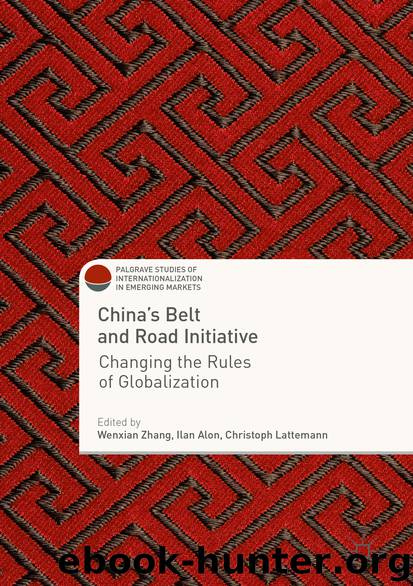China's Belt and Road Initiative by Wenxian Zhang Ilan Alon & Christoph Lattemann

Author:Wenxian Zhang, Ilan Alon & Christoph Lattemann
Language: eng
Format: epub
Publisher: Springer International Publishing, Cham
3 Navigating Mutual Dependence and Power Imbalance
The idea of African businesses making adjustments to increase their standing in BRI exchanges may be conceptualized with the RDT—that organizations must restructure their dependency on the external environment in order to increase their chances of survival (Pfeffer and Salancik 1978). Kaplinsky and Morris (2008) present an example of supply chain adjustment adopted by a South African producer of underwear that faced severe competitive challenges from Chinese imports. The company helped its retailers reduce inventory holdings and improve their responsiveness to customer demand—a clear example of relational performance in the supply chain (Carter et al. 2017; Cheung et al. 2011). This company had the capability to restructure its dependency on the external environment; and such traits make it an attractive target for partnerships. Partnering (including alliances, joint ventures, co-optation, interlocks, mergers, or vertical integration) is one way to create a long-term view of cooperative business exchanges and reduce uncertainties across the supply chain (Hillman et al. 2009). The opportunity for value-creating long-term partnerships will increase when the competitive levers across specific industries in Africa are identified and nurtured.
Casciaro and Piskorski (2005) view mutual dependence and power imbalance as two related aspects of the RDT notion of interdependence between two parties in an exchange. Pfeffer and Salancik (1978) focused on minimizing interdependence; however, there is value to collaboration and reciprocity especially between buyers and sellers (Ado and Su 2016). High levels of mutual dependence shift exchange relationships more toward symbiosis than competition. Thus, the competitive impacts of power imbalance may be reduced if mutual dependence is high. In the case of African countries, even though the balance of power is heavily in China’s favor, the exercise of that power may be restrained if high levels of mutual dependence exist between Africa and China. Clearly, bilateral relations between African countries and China will yield more benefits if African businesses can supply substantial resources that are critical to the BRI. Such resources must be identified carefully, since in several industries (such as textiles) China has comparative advantage in the factors of production. Challenges in various industries, such as capacity limitations, make production sharing an attractive model for competitively scaling the output of national or regional supply chains. Koopman et al. (2010) view supply chains as systems of value-added sources and destinations within integrated production networks. The integration of production networks is at the core of production sharing and implies a reorganization of the production function. Reorganization might involve achieving a balance between outsourcing peripheral productive functions across a regional network and controlling the centers of value creation (Neilson et al. 2014). The functions in the network need to be assigned collaboratively rather than just dictating the terms of engagement to supply chain partners. This collaborative approach to production sharing may be a useful framework to consider within industry sectors (Wang et al. 2013). In other words, with proactive collaboration in a specific industry, it may be possible to establish unique regional or country production advantages, relative to Chinese businesses, and thus create a basis for increased mutual dependence.
Download
This site does not store any files on its server. We only index and link to content provided by other sites. Please contact the content providers to delete copyright contents if any and email us, we'll remove relevant links or contents immediately.
The Brazilian Economy since the Great Financial Crisis of 20072008 by Philip Arestis Carolina Troncoso Baltar & Daniela Magalhães Prates(117874)
International Integration of the Brazilian Economy by Elias C. Grivoyannis(87731)
The Art of Coaching by Elena Aguilar(52870)
Flexible Working by Dale Gemma;(23239)
How to Stop Living Paycheck to Paycheck by Avery Breyer(19616)
The Acquirer's Multiple: How the Billionaire Contrarians of Deep Value Beat the Market by Tobias Carlisle(12206)
Thinking, Fast and Slow by Kahneman Daniel(12012)
The Radium Girls by Kate Moore(11891)
The Art of Thinking Clearly by Rolf Dobelli(10167)
Hit Refresh by Satya Nadella(9011)
The Compound Effect by Darren Hardy(8769)
Tools of Titans by Timothy Ferriss(8178)
Atomic Habits: Tiny Changes, Remarkable Results by James Clear(8154)
Turbulence by E. J. Noyes(7913)
A Court of Wings and Ruin by Sarah J. Maas(7604)
Change Your Questions, Change Your Life by Marilee Adams(7597)
Nudge - Improving Decisions about Health, Wealth, and Happiness by Thaler Sunstein(7518)
How to Be a Bawse: A Guide to Conquering Life by Lilly Singh(7359)
Win Bigly by Scott Adams(7065)
